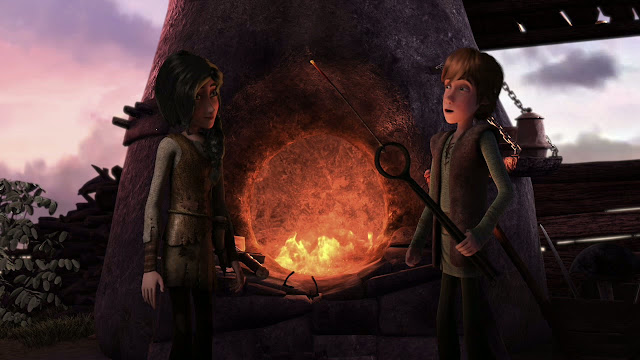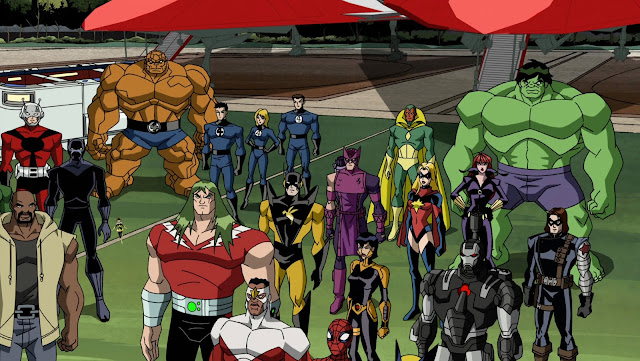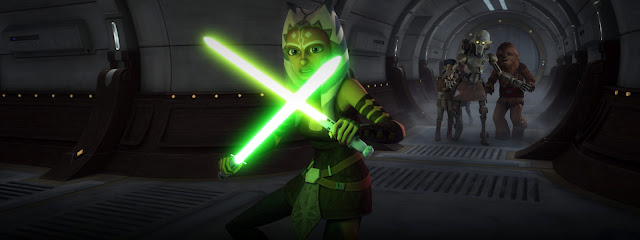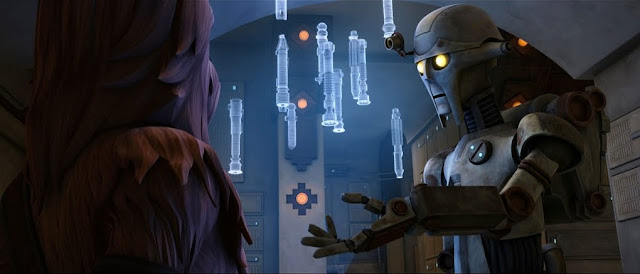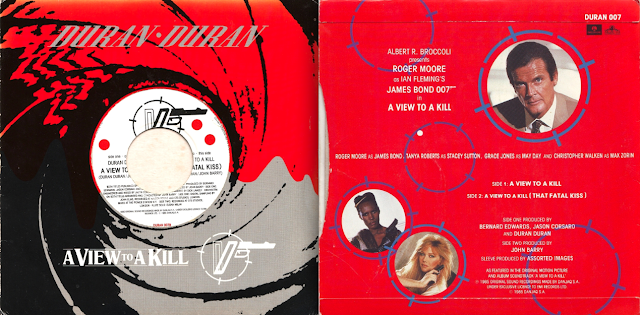 |
| Farewell, the one-season wonder that is Motorcity! Screw you, Disney XD! (Photo source: Guts-N-Effort) |
Every Wednesday in "5-Piece Cartoon Dinner," I dine on five of the week's most noteworthy animated cable shows that are found outside my Adult Swim comfort zone. The episodes are reviewed in the order of when they first aired.
Transformers Prime concludes its second season with a tense cliffhanger that raises the stakes and shakes up the show's premise of aliens getting comfy with their new home on Earth because now, thanks to an attack by Megatron's floating fortress, there's no longer a base for Team Prime to call home. At the end of "Darkest Hour," the Autobots and their young human cohorts are forced to split up to avoid getting captured by the Decepticons and are now on the run, which hints that season 3 will be more like The Hub's other '80s toy-based Hasbro Studios action cartoon, the now-defunct
G.I. Joe: Renegades, which turned the Joes into
A-Team-style fugitives.
The on-the-run arc looks like it'll be more engaging than the relic-hunting arc, which I found to be sometimes tedious. One thing this series is good at is conveying how dangerous it is for the kids to be involved in an intergalactic war, and the much-needed change in setting will hopefully emphasize that.
"What will [the kids] do? How will they cope? They can’t go back to school or have any semblance of a normal life; the Cons know who they are and where they live," wrote
a Transformers Prime recapper on Toonzone. "Jack can’t even see his mother. Their entire world crumbled in one fell swoop and I doubt they can pick up the pieces so easily."
Optimus Prime appears to be dead after failing to escape the attack on the Autobot base. But there's no way this series is going to keep him dead permanently. His name is in the series title. Unless they replace Optimus with a new and younger Prime, they're going to have to change the series title to
Transformers: Exodus or something equally portentous.
***
We know things won't end well for Tron on
Tron: Uprising when this prequel show will reach its final episode because
Tron: Legacy revealed that Clu (Fred Tatasciore) captured Tron and had him "repurposed" (his new evil identity after the brainwashing was Rinzler). In part 2 of "Scars," we get to see what repurposing looks like when the show flashes back to the first time Clu's forces captured Tron and threatened to repurpose him. But instead of erasing Tron's identity and memories because he finds the repurposing procedure to be "crude," Clu's henchman
Dyson (John Glover) disfigured Tron's purdy face with a saw-like device (as payback for half of his own face getting sliced off by an unknown attacker's identity disc during an ISO riot that Tron was assigned to handle) and sent him away on a Recognizer ship to be executed.
Dyson doesn't know that Tron's life was saved by
Cyrus (Aaron Paul from
Breaking Bad), a guard on the Recognizer who secretly opposed Clu's regime and helped Tron to escape, so that's why Dyson and most of the programs in The Grid think Tron is dead. Cyrus' words of encouragement to Tron--he told him, "We can't let your revolution end before it has a chance to start, bitch!"--sound exactly like what Beck says to Tron to stop him from derezzing Dyson, and Beck's warning to Tron that killing Dyson will taint what he set out to accomplish causes Tron to change his mind and spare Dyson's life.
The flashback that introduces Cyrus lends credence to a theory I have about Beck. For a while, I thought he's actually a program created by either Kevin Flynn (Tatasciore) or Tron to take Tron's place in the revolution against Clu someday, just like how
Justice League Unlimited's Amanda Waller had Bruce Wayne's DNA implanted into the father of
Batman Beyond hero Terry McGinnis to ensure that Terry would grow up to succeed Bruce as Batman.
Cyrus' physical appearance closely resembles Beck's, and so does his voice, which is similar to Elijah Wood's (at first, I wasn't able to identify the actor who voiced Cyrus--for a while, I thought he was Adrian Pasdar, not Paul--because Disney XD does a wonderful job of squishing the credits so that you can't read them). Also, Cyrus' name is an extremely nerdy reference to
the Cyrus-Beck line clipping algorithm. I now think Beck is a repurposed version of Cyrus. At some point in the time period between the year that "Scars" flashed back to and the first
Tron: Uprising episode, someone must have used the repurposing tech to erase Cyrus' identity and memories and replace them with a different identity as the younger mechanic program Beck, perhaps to keep Cyrus safe and plant the seed for the revolution to re-emerge when the time is right. I know that's a batshit crazy theory, but the
Tron franchise has come up with equally ridiculous ideas before, like the whole Rinzler/Tron thing that came out of nowhere in
Tron: Legacy.
Like I said last week, "Scars" is reminiscent of
Batman: The Animated Series' "Robin's Reckoning" two-parter. The differences in opinion between Beck and Tron about killing Dyson are exactly like the temporary discord between Batman and Robin over gangster Tony Zucco. Another resemblance to "Robin's Reckoning" is the fact that part 1 of "Scars" is a stronger half than part 2, just like what happened with "Robin's Reckoning," which was still a standout
B:TAS story even though it sort of fell flat in part 2. Of course Tron would never derez Dyson--this is a Disney XD show, so the hero will never be allowed to do something so extreme--but I wanted Tron to remain off his rocker for a little while longer. Maybe it's because I've lately been watching a shitload of TNT's nonstop marathons of
The Mentalist, where the revenge-driven title character gets to be crazy--all the time.
***
The trailer house that puts together AMC's "next week on
Mad Men" promos came up with a brilliant strategy for its promo editors: if you're going to cull dialogue from next week's episode, pick out only the least interesting lines or edit those lines down so much--like down to just three or four words (and if it's just Don in the clip, even less than that)--that they make very little sense out of context. These cryptic, mostly announcer-less and unrevealing
Mad Men promos have been known to annoy many viewers who are dying to know what will happen next week, but it's not surprising that they're so cryptic and so devoid of spoilers. Famously guarded and secretive
Mad Men showrunner Matthew Weiner wouldn't want it any other way.
I wish more cable channel promo departments followed the AMC
Mad Men promo model because otherwise, you wind up with mishaps like Disney XD carelessly spoiling the ending of
Motorcity's "Like Father, Like Daughter" episode in its promos. It didn't ruin the enjoyment of the episode, but it took a lot of the surprise out of the ending.
The high-octane action sequences are what first drew me to
Motorcity (before I found out that the show involved writers and animators from the Cartoon Network cult favorite
Megas XLR, and then that's when I really became invested in the show). Like I said last week while discussing
Kaijudo: Rise of the Duel Masters'
Locomotivator scenes, I'm a sucker for set pieces that involve speeding trains, and "Like Father, Like Daughter" contains a couple of enjoyable bits of caper action as the Burners attempt to steal a trove of vintage cars from a floating KaneCo freight train that the corporation refers to as a "Deluxitram."
Abraham Kane has been destroying cars as a way to deprive the people of both Detroit Deluxe and the underground Motorcity of their freedom, so to foil Kane's upcoming car-burning ceremony, the Burners formulate a plan to take as many cars as possible from KaneCo storage and give them back to the people, an idea Julie came up with. "They can't fight [Kane], they can't run from his bots, all because they don't have cars," says Julie to Mike.
The team's heist gets disrupted by Kane's new employee Red (Eric Ladin, a.k.a. Betty's brother William on
Mad Men), a masked assassin who's returned for a rematch with Mike after first tussling with him in
"Vendetta." But for the first time in the show's run, I was less interested in the action-y stuff in the A-story and more interested in the non-action-y material in the B-story, which has Julie spending a day with her dad Kane. It sounds like a dull B-story (or is this the A-story and not the B-story?), but Titmouse comes up with ways to keep us engaged in what could have been really talky and lifeless scenes, like the gorgeous
Blade Runner Tyrell pyramid-style lighting during a scene inside a high-rise Detroit Deluxe restaurant.







